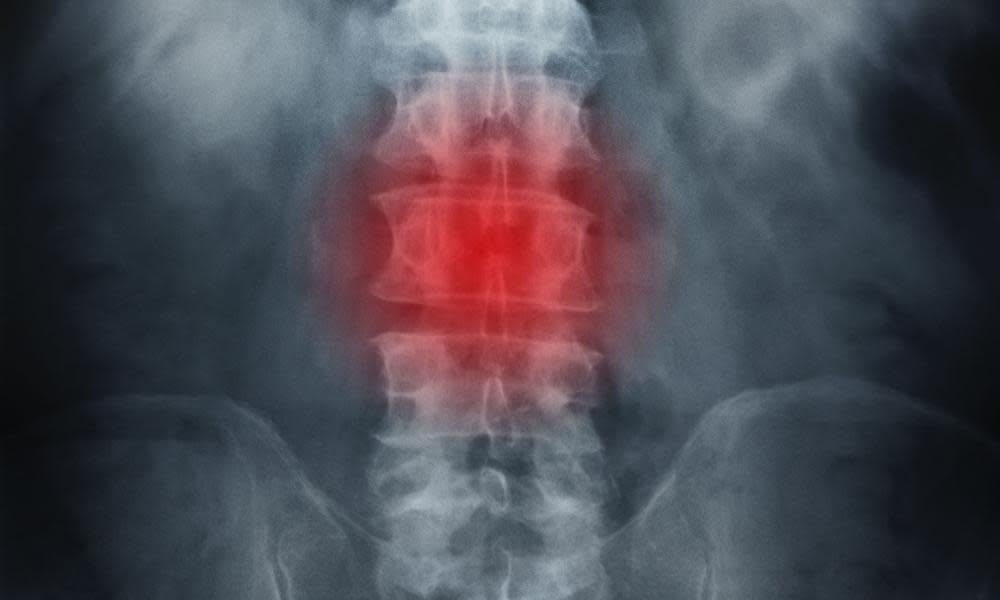Doctors told to think twice before signing patients off work or ordering x-rays

Doctors should rethink classifying patients as unfit for work and instead consider how work could benefit their recovery, an expert body has recommended.
The proposal is among the latest recommendations released on Monday by NPS MedicineWise, an Australian-based organisation led by medical experts and peak bodies to help doctors and patients avoid tests and medications that may be unnecessary or even cause harm.
The president of the Australasian Faculty of Occupational and Environmental Medicine, Associate Prof Peter Connaughton, said work-related injury and time off for illness cost the Australian economy an estimated $61.8bn each year directly and indirectly.
“The recommendation from our faculty provides an opportunity to emphasise the very important role good work has in contributing to the overall health and well-being of our country,” he said.
“On a personal level in my clinical experience, I see the emotional and physical impacts that not being able to work as a result of injury has on people’s lives, and people declared medically unfit for work experience isolation, loss of self-esteem, depression, poorer health and slower recovery times.”
Connaughton said his organisation had also recommended against unnecessary x-rays for those suffering lower back pain. A perspective piece published in the Medical Journal of Australia in 2016 described how lower back pain was the most common symptom seen in primary care, with the underlying injury often exacerbated by psychological and social stressors. Patients often had high expectations about what medicine could do to fix their pain, the authors wrote, and expected a surgical solution.
But Connaughton said there was no evidence that x-rays were effective for identifying the underlying cause of lower back pain unless there were very clear clinical indicators that something more serious might be going on.
“They expose workers to unnecessary radiation,” he said. “Backache is so common in our society and most are benign, self-limiting and do not warrant x-rays, which in fact can be harmful due to adverse health effects related to the radiation exposure, and incidental findings that might trigger anxiety and concern in patients and sometimes lead to more unnecessary further testing and investigation.”
The updated guidelines also caution that Australian children are having too many unnecessary diagnostic x-rays. The Royal Australasian College of Physicians [RACP] said x-rays should not be routinely used to diagnose children suffering bronchiolitis, asthma or nonspecific abdominal pain. The recommendation reflects clinical evidence that found chest x-rays significantly altered therapeutic management only in about one in 100 children with typical bronchiolitis. In more than 95% of cases, an abdominal x-ray offers no insight into the cause of non-specific abdominal pain in children.
“For any parents who might be concerned about the idea that ‘less can sometimes be more’, I would say to them we want to make sure we are only ordering a test when it is medically beneficial for your child,” said Dr Sarah Dalton, the president of the RACP’s paediatrics and child health division.
“In the case of abdominal x-rays, we know they actually have more radiation than chest x-rays and in some cases have been shown to be unnecessary for diagnostic purposes. This is why we’re calling attention to their use in children, and urging doctors to think twice before ordering their next one.”
Meanwhile, a new recommendation from the Internal Medicine Society of Australia and New Zealand targets Australians over 65 who are regularly taking five or more medications, including over-the-counter purchases such as vitamins.
The president of the society, Dr Robert Pickles, said those patients should ask their doctor whether their medication regime should be downgraded.
“We often forget our bodies change with age and out body’s responses tend to change with age,” Pickles said.
“Anti-diabetic drugs can become more potent as people age and as kidney function deteriorates and muscle bulk decreases, leading to low blood sugar, falling over and harm from falls.” Patients sometimes kept taking drugs that were needed only in the short-term, he added.
The medicines older Australians should consider avoiding include: benzodiazepines, anti-psychotics, hypoglycaemic agents, antithrombotic agents, anti-hypertensives and anti-anginal medicine, he said.

 Yahoo News
Yahoo News 
